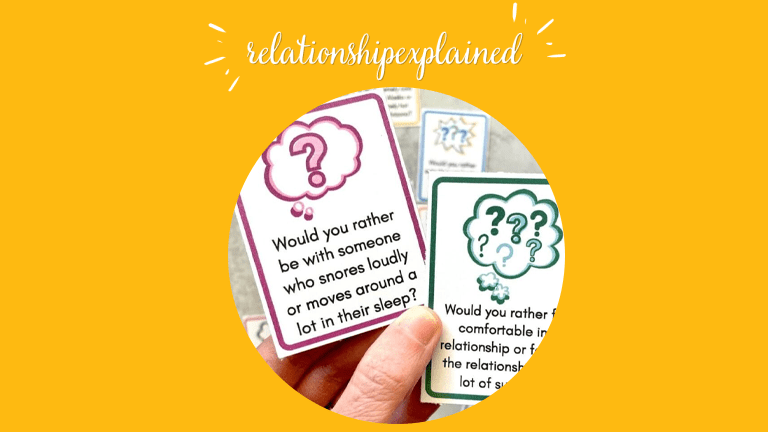Do Relationships Come Naturally?
Relationships may not always come naturally and may require effort and communication to sustain. But there are certain ways by which conscious effort can help nurture and strengthen a relationship, such as ensuring effective communication, finding common ground, and offering support and encouragement.
In the realm of human connections, the age-old question persists: Do relationships happen naturally, or do they require conscious effort to flourish?
We humans are wired to connect, but modern relationships can be complex. Our natural instincts lay the groundwork, giving us feelings of closeness and companionship.
Yet, making relationships last involves more than just instincts – it calls for good communication, understanding, and compromise. It's a mix of our natural tendencies and the effort we put in.
In this blog, we'll delve into this balance – how our natural inclinations and conscious choices shape the beautiful dance of human connections. Join us as we navigate through the complexities and uncover the truth about whether true love blooms effortlessly or if it necessitates conscious dedication to blossom.
10 Reasons Why A Relationship May Not Come Naturally
1. Different Personalities And Communication Styles
Relationships might not come naturally due to differences in personalities and communication styles. Individuals may struggle to understand and relate to one another's unique ways of expressing themselves and addressing challenges. Some prioritize their own happiness, seeking fulfillment within the present moment, while others long for a soul mate, hoping to find a profound connection that transcends ordinary bonds. When personalities clash, it can lead to misunderstandings and conflicts.
2. Past Experiences And Traumas
Past experiences and traumas can significantly impact an individual's love life, affecting their ability to form deep connections. Emotional wounds from previous relationships or childhood experiences may create barriers to vulnerability and trust. Without mutual support and understanding, these unresolved issues can interfere with the development of a healthy and fulfilling relationship
3. Differing Interests And Hobbies
Differing interests and hobbies between individuals can present challenges in forming a romantic connection. While shared passions can ignite a spark, dissimilar pursuits may lead to being relegated to the "friend zone" rather than progressing into a long-term relationship. Without shared interests, maintaining mutual enthusiasm and sustaining the relationship's excitement might become more challenging.
4. Varied Life Goals And Priorities
When individuals have varied life goals and priorities, it can create tensions and complexities within a relationship. Each person's aspirations may pull them in different directions, and finding a harmonious balance becomes crucial for the relationship to thrive. The challenge lies in ensuring that both partners can pursue their dreams in a healthy way while still feeling secure and supported in the partnership.
5. Cultural And Societal Norms Shaping Expectations
Cultural and societal norms can significantly impact the way individuals approach relationships. External expectations may pressure individuals to conform to traditional notions of love and marriage, influencing their perception of what a "secure" relationship should entail. This can lead to situations where people rush into commitments based on societal pressures rather than genuine feelings.
For some, the idea of love at first sight, might be romanticized, prompting them to jump into relationships without truly knowing the other person. Additionally, societal norms might influence individuals to prioritize remaining "just friends" rather than exploring deeper emotions, fearing the potential consequences of expressing their true feelings. Such influences can complicate the path to forming authentic and meaningful connections.
6. Fear Of Commitment Or Intimacy
The fear of commitment or intimacy can be a formidable barrier to establishing a meaningful relationship. Individuals may hesitate to invest fully emotionally due to past disappointments or fear of vulnerability. This fear can stem from a desire to protect oneself from potential heartache or simply a reluctance to let someone else into their life.
7. Emotional Baggage From Previous Relationships
Emotional baggage from previous relationships can cast a long shadow on new connections. Lingering feelings of hurt, betrayal, or mistrust can create emotional barriers, making it difficult to invest in a new relationship fully. Past experiences might lead individuals to approach new partners with caution and skepticism, fearing a repeat of past pain.
8. Misaligned Values And Beliefs
Misaligned values and beliefs between partners can create significant challenges in a relationship. When fundamental principles clash, it becomes challenging to find common ground and understanding. For instance, conflicts may arise if one person prioritizes a career-driven lifestyle while the other seeks a more laid-back approach.
9. External Pressure And Stressors
External pressures and stressors can put a strain on a relationship. Demands from work, family, or other responsibilities may leave partners with less time and energy for each other. These pressures can lead to feelings of neglect or being undervalued, causing one or both individuals to feel bad about the relationship.
10. Lack Of Effective Communication And Emotional Intelligence
A lack of effective communication and emotional intelligence can hinder the natural progression of a relationship. Misunderstandings and unresolved conflicts may arise due to poor communication skills. Additionally, the inability to comprehend and empathize with each other's emotions can lead to emotional distance between partners. Without recognizing and addressing these issues, the relationship can stagnate or deteriorate.
How To Nurture A Relationship That May Not Come Naturally
1. Maintain Effective Communication
Communication is the cornerstone of any successful relationship, especially when it doesn't come naturally. To nurture a bond, partners must prioritize honest and open dialogue, fostering an environment where feelings and thoughts can be freely expressed. By communicating openly, they gain insight into each other's needs and desires, strengthening the connection.
An open mind is vital during these conversations, as it allows partners to appreciate each other's perspectives and work towards a common ground. Expressing happiness and gratitude in these discussions reinforces positive reinforcement, making both individuals feel valued and understood. Through consistent communication, partners can navigate challenges, celebrate achievements, and grow together in their lives.
2. Show Empathy And Patience
When past experiences and traumas affect trust and vulnerability, nurturing the relationship requires a delicate approach. Partners must embrace empathy and patience, allowing each other the space to heal at their own pace. It's essential to create an atmosphere of emotional safety where individuals feel comfortable sharing their feelings without fear of judgment or reprisal.
By acknowledging and understanding the impact of past hurts, partners can work together to build a stronger and more resilient connection. Engaging in activities that bring joy and fun can also help lighten the emotional burden. It can foster a positive atmosphere that reinforces the point that the relationship is a place of support and healing.
3. Find Common Ground
Differing interests and hobbies can either be a source of contention or an opportunity for growth in a relationship. To nurture the bond, partners should embrace a sense of curiosity and willingness to explore each other's passions. Engaging in activities that are new to both of them can be an exciting way to bond and discover shared interests.
While it's essential to respect each other's individual pursuits, finding common ground in recreational activities is one of the ways to help love develop. Additionally, incorporating elements of playfulness and spontaneity into the dating process can inject a sense of adventure and novelty, further strengthening the connection.
4. Offer Support And Encouragement
When partners have varied life goals and priorities, it is crucial to approach the differences with understanding and empathy. Fear should not dictate the course of the relationship; instead, open and honest discussions should prevail. By sharing their aspirations and dreams, partners can gain insight into each other's perspectives, finding common ground or compromises that satisfy both.
It is essential to recognize that differing life goals don't necessarily mean a lack of compatibility; it merely highlights the uniqueness of each individual. What truly matters is the willingness to support each other's journeys, encouraging personal growth while nurturing the relationship as a foundation for mutual love and happiness.
5. Embrace Compromise
When cultural and societal norms shape relationship expectations, partners may feel constrained by external pressures. It's crucial to recognize that the relationship is about the two individuals involved, not adhering to societal norms. In the dating phase, take the time to understand each other's values and beliefs and prioritize what truly matters for the relationship to flourish.
Falling in love should be an organic process, not a performance based on external expectations. Embrace the uniqueness of the partnership and create a safe space where both partners can express their authentic selves. A genuine connection founded on mutual respect and understanding will stand strong regardless of societal norms.
6. Continuously Learn And Adapt
In the dating phase, fear of commitment or intimacy can hinder the natural progression of a relationship. Partners may be afraid of getting too close or opening up emotionally due to past hurts or insecurities. However, it's essential to address these fears openly and honestly. Building trust and emotional connection takes time, and it's okay to take things at a pace that feels comfortable for both partners.
Falling in love requires vulnerability, but it also offers the opportunity for profound emotional growth and connection. By understanding each other's fears and providing a supportive environment, partners can gradually overcome their reservations and embrace a deeper, more meaningful relationship.
7. Create A Safe Space For Discussions
When emotional baggage from previous relationships clouds the present, partners may feel apprehensive about fully investing in the new connection. Past hurts, and unresolved issues can create emotional barriers that hinder trust and vulnerability. It's crucial to acknowledge and understand these feelings, as they may influence the way the partner perceives the current relationship.
Instead of assuming how the other person is "supposed" to act, show genuine interest in their emotions and experiences. Create a safe space for open discussions about past relationships, where they feel secure, providing support and reassurance that the past doesn't dictate the future. By addressing emotional baggage with empathy and compassion, partners can foster a healthier and more authentic connection.
8. Avoid Rushing To Conclusions
When partners have misaligned values and beliefs, it can be challenging to navigate the relationship waters. Rather than rushing to conclusions or making assumptions, it's crucial to wait and let the connection unfold naturally. Falling in love isn't an instantaneous process but rather a gradual exploration of each other's core values.
Take the time to focus on understanding one another's beliefs, opinions, and principles. Be interested in each other's perspectives and open to respectful discussions. What matters is the willingness to listen and learn from each other, allowing the relationship to grow on a foundation of mutual respect and understanding.
9. Work As A Team
When external pressures and stressors threaten to disrupt the path to finding love, partners must approach the situation with care and understanding. It's natural to feel afraid or overwhelmed when faced with life's challenges, but what matters is how the couple navigates them together.
Show genuine interest in each other's struggles and be a source of support during tough times. Create a safe space where partners can express their feelings without judgment, allowing them to feel heard and understood. By facing external pressures as a team, the relationship can grow stronger, and partners will feel good knowing they have each other's back through life's ups and downs.
10. Seek Guidance
When faced with relationship challenges that seem insurmountable, seeking guidance is a beacon of hope. Recognizing that relationships require putting in hard work and commitment, partners may decide to begin couples counseling or workshops. These resources offer valuable insights, providing a neutral space to explore issues, develop communication skills, and deepen emotional intelligence.
The process may be difficult, demanding introspection and vulnerability, but the rewards are worth it. Guidance from a professional or a supportive community can rekindle hope and offer a roadmap for positive change. Embracing the hard work required to grow together can lead to a more resilient and flourishing relationship filled with love and understanding.
Conclusion
In the realm of relationships, the answer to whether they always develop naturally remains complex. While initial attraction is a normal starting point, it may not guarantee a natural progression.
Tiredness or lack of immediate sparks should not be disheartening. Instead, valuing friendship emerges as the important part. Building genuine connections based on trust, understanding, and shared ideas is equally meaningful.
Whether through friendship or love, relationships can thrive with effort and dedication. Embracing the uniqueness of each bond becomes the true answer, reminding us that there is no one-size-fits-all formula for love. In the end, cherishing the journey and cultivating meaningful connections remains the most important thing.













